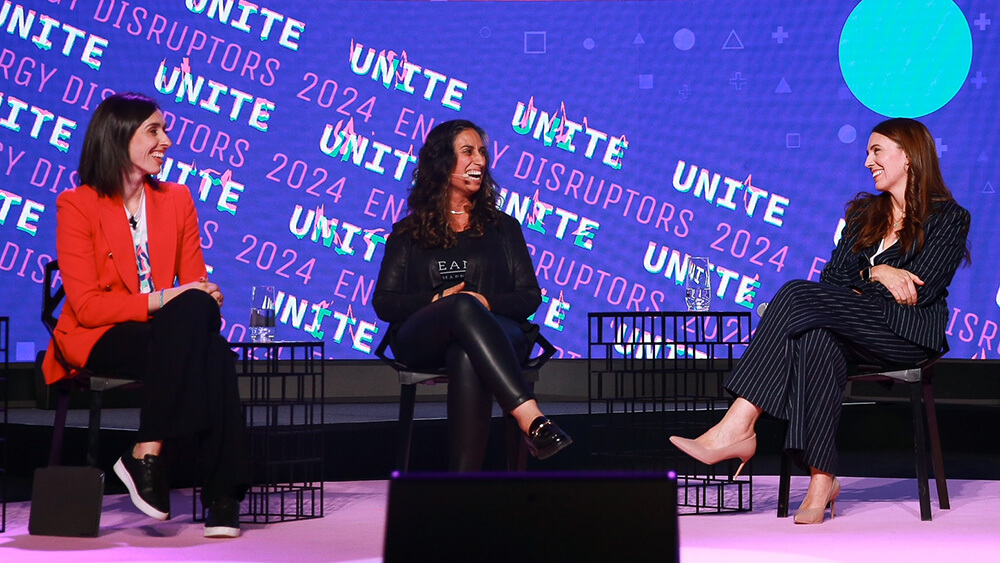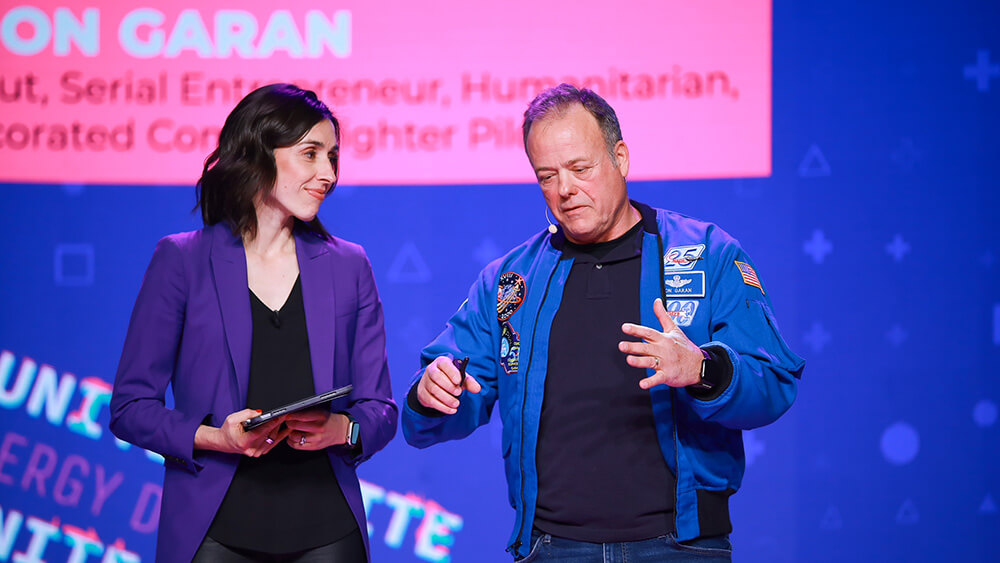
During a headliner panel at Energy Disruptors: UNITE 2024, Holly Ransom, left, spoke with Sona Khosla, chief impact officer at Benevity and Jacinda Ardern, former prime minister of New Zealand.
In 2016, when speaker, moderator, author, and entrepreneur Holly Ransom hosted Sir Richard Branson’s Virgin Disruptors conference — which focuses on catalyzing innovation across the business sector by bringing together diverse voices — Graeme Edge was in the audience.
On the flight back to Calgary from London, where Virgin Disruptors had been held, Edge — an entrepreneur and founder of several energy-oriented businesses in Calgary, Alberta, Canada — thought more about what a world-class event taking a multidisciplinary approach for the energy ecosystem could look like. He discussed his idea with his wife, Michelle Edge, along with his business partner Rachel Maxwell, according to a Calgary Herald article, and they agreed to launch the Energy Disrupters: UNITE (EDU) summit. EDU would bring global thought leaders from a variety of backgrounds and disciplines together to discuss new business models, disruptive technologies and innovations, global policy trends, cultural and social transformation opportunities, and the need for multi-stakeholder and unlikely collaborations.
Edge reached out to Ransom to share their bold vision and ask her to join. “He wrote me a note on LinkedIn and said, ‘I’m so inspired by this collision of unlike minds that came to the stage [at Virgin Disruptors] and this renewed energy and out-of-the-box thinking that was brought to the dialogue,’” Ransom recounted to Convene. In his message, Edge added: “I think this is desperately what Canada needs, and this is definitely what the energy ecosystem needs.’”
Ransom signed on to be a cofounder of the event, motivated, she told Convene, by her “real passion, broadly, for how we disrupt patterns and thinking and conversation in a way that can entertain the possibility of new answers” — and her belief that face-to-face events are the best channels for those conversations. “And for me, there really is no more important conversation than the one around securing a future for our planet and making sure we can progress to a much more sustainable energy future.”
Innovation in this area has been hampered in the past, Ransom said, by the siloed nature of the energy industry. “Oil and gas would have their summits over here and you’d have a solar meeting over there and then the mining industry would come together here — there was almost no cross pollination, no productive heat and tension and exploration of the collaboration that’s going to be required.
“What we found, almost exclusively,” she continued, “was that these conversations were the energy sector talking to themselves, and very rarely were we actually getting the benefit of leaders coming from outside the sector who had opinions and expertise that could contribute.” Noting that everyone in the energy sector is dealing with change and transformation at an unprecedented scale, Ransom and her event co-founders wondered: “Why wouldn’t we get in people who can help us talk through how we [become] more effective leaders?”

Ron Garan, former NASA astronaut, spoke with Holly Ransom about the lessons he learned living on the International Space Station at EDU 2024.
The inaugural two-day EDU summit was held in 2018 and has since been held in 2019, 2022, and 2024 in Calgary, most recently at the BMO Centre shortly after its $500-million expansion. The event has attracted some of the most influential figures in the world as headliners, including author Malcolm Gladwell; Sanna Marin, former prime minister of Finland; Jacinda Ardern, former prime minister of New Zealand and board member of The Earthshot Prize; Ron Garan, a retired NASA astronaut; and — full-circle moment — Virgin Group founder Richard Branson.
A solutions-focused summit, EDU features speakers from the entire energy sector — leaders from waste and carbon utilization companies to geothermal companies to commercial fusion energy companies — as well as compelling experts from outside of the sector. Among them are futurists, historians, and psychologists like Ali Burston, Ph.D., a behavioral change disruptor, who spoke at EDU 2024.
At the event, Ransom said, “you’re always hearing about pain points that are popping up” in the different sectors of the energy ecosystem. “We go, ‘Great, who are some people that are best in class in North America and around the world that we can bring in to helpfully guide this conversation and add to people’s toolkits?’” Ransom said. “That’s the way we think about the program every year, where we have both on the mainstage and side stages a healthy mix of industry expertise.”
EDU also does its part to get attendees — most of whom are industry workers, half at director-level or higher, followed by academics, policymakers, and students — quality time with its high-profile speakers who provide tangible takeaways. In one particularly immersive session, delegates were asked to pour ice water into a bathtub containing extreme athlete, mindset coach, and personal trainer André Belibi Eloumou, while he gave a 15-minute talk about his physical, mental, and spiritual wellbeing techniques. And in the event’s VIP track, introduced in 2024, attendees had the opportunity to extend their mainstage learnings by having one-on-one conversations with speakers like former prime minister Marin, book signings with authors speaking at the event, “An Hour With…” sessions, “and equally, a space and dedicated time where they could interact with one another,” Ransom said.
Getting individuals from all different industries in the same room has led to some significant collaborations. For example, Suncor Energy CEO Mark Little was introduced to LanzaTech CEO Jennifer Holmgren at EDU in 2019. The following year, “Suncor helped LanzaJet take flight as a founding investor with $15 million in funding for its proprietary alcohol-to-jet sustainable aviation fuel (SAF) technology,” Ransom said, as well as to fund an SAF commercial demonstration facility.
‘Not Your Grandfather’s Energy Event’
Despite being rooted in the critically important challenge of energy transformation and climate change, EDU, she said, imbues a sense of playfulness into its program, something that has “really been at the heartbeat of how we’ve tried to deliver content and design the event.”

“One of the things that’s been great to watch is when people watch these performances, it pattern-interrupts,” said Holly Ransom of the conference’s entertainment choices. “You don’t come into a room expecting to see something like that.”
“We were determined to not be your grandfather’s energy event,” Ransom said, and that includes the goal of attracting a “much more diverse audience” to the event. Having a fun and energetic vibe has helped EDU appeal to a younger demographic. Out of a total of 3,000 attendees in 2024, 700 were under the age of 35, “which is fantastic, to be bringing in such a strong voice of that younger generation,” Ransom said. Approximately 35 percent of people on EDU’s stages are “visible minorities,” she said, and half of the speakers are women.
Part of that vibe comes from infusing the summit with live music and the arts — performances from a violinist, cellist, singer-songwriter, the Calgary Regional Dance performers, and a renowned circus artist were part of the attendee experience in 2024.
“One of the things that’s been great to watch is when people watch these performances, it pattern-interrupts,” Ransom said. “You don’t come into a room expecting to see something like that.” These artistic performances take attendees to a different emotional and mental place, she added, so they might then receive the next bit of content differently than if it was “on the back of nonstop presentations.” The creative elements of the event also lend themselves well to the concept of the “collision of unlike minds” that EDU strives for, Ransom said.
The performances also can serve as convenient icebreakers for conversations during networking breaks, she said. “What I love is that sometimes the start of the conversation is about, ‘Oh my gosh, can you believe what that person did with hula hoops?’” It’s a great entry point for a conversation between strangers “that leads the two of you to get into a conversation around how you can do business together,” she said, that might not have happened otherwise.
“Creativity has played those three roles for us: Facilitating the collaboration, changing the way that people interpret content, and then ultimately positioning the event more inclusively than what a typical energy event might look and feel like,” she said, “and who might think they belong in it.”
Casey Gale is managing editor of Convene.
On Track
In 2024, Energy Disruptors: UNITE introduced specific education tracks for the first time — the RBC Track: Financing the Energy Transition; the Pathways Track: Canada — an Energy Transition Superpower; and the Energy Disruptors Track: New Energy.
The positive response to the tracks was “overwhelming,” according to event co-founder Holly Ransom. “The sessions were so well-attended, most of them were standing-room only,” she said. Track session spaces were designed to include unique features that resonated with attendees, like one that made attendees feel like they went to a campfire, she said. “There were s’mores doughnuts as you came in, you could drink hot chocolate. And so you’d get transported into the experience in that room. I equally think it added to people’s experience, because there was just an element of uniqueness.”
On the Web
To learn more about Energy Disruptors: UNITE visit EnergyDisruptors.com.
